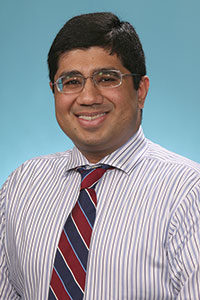
Hrishikesh Satish Kulkarni
Over the past few years, knowledge of the complement system has expanded, and researchers have identified several complement proteins as being synthesized in the lung and by key immune cells such as CD4+ T cells, dendritic cells, macrophages, and innate lymphoid cells. These cells play crucial roles in affecting the local microenvironment. In addition, recent studies have shown that complement proteins can modulate cell survival, polarization, and fate.
“While nobody doubts that complement affects certain lung pathologies, we must utilize emerging concepts, methods, and therapies to investigate whether targeting this system mitigates lung inflammation,” said Hrishikesh Satish Kulkarni, MD, MSCI, ATSF, instructor of medicine at Washington University in St Louis, a co-chair of this afternoon’s session. “In our session, we will discuss how key fundamental studies relate to hard-to-treat lung diseases and the mechanisms by which complement activation drives these diseases.”
The increasing number of clinical conditions associated with complement-pathway dysfunction has spurred a regained interest in therapeutic options to modulate the complement system.
“Molecular insight, technologic advances, and the first decade of clinical experience with the complement-specific drug eculizumab have increased confidence in therapeutic complement inhibition,” said Dr. Kulkarni. More than 20 candidate drugs that target various stages of the complement cascade are currently being evaluated in clinical trials, and additional agents are in preclinical development.
“An area in complement biology that has been overlooked in lung diseases is how the downregulation of complement inhibitory proteins such as CD46 and CD55 are contributing to fibrosis, which we will highlight in this session,” said Ragini Vittal, PhD, assistant research professor at the University of Michigan in Ann Arbor, who is also co-chairing the session. “Furthermore, the conventional thought is that the complement system is solely an integral arm of the innate immunity. However, a growing body of evidence demonstrates that complement activation extends beyond its known canonical signaling by triggering intracellular and non-canonical signaling that has an impact on the local non-immune cells.”
This session’s speakers will also outline therapeutic concepts, targets, and candidate drugs; the findings of recent clinical trials; and the challenges in developing complement therapeutics and how they could be potentially applied to different lung diseases such as pneumonia, transplant rejection, and lung cancer, in addition to what is known about asthma and interstitial lung disease.
Complement as a Novel Target to Mitigate Lung Disease (C88)
2:15-4:15 p.m., Tuesday
Room D220/D227 (Level 2), KBHCCD
“Although complement is indeed an evolutionarily ancient immune system, it remains fascinating and still provides the novelty of investigating the signaling of key components within each microenvironment and discovering potential untapped therapeutic targets that are either common or unique to each lung disease,” said Dr. Vittal.
Dr. Kulkarni said that researchers are increasingly seeing various complement proteins in the large-scale transcriptomic and proteomic analyses for different lung diseases and model systems. Thus, the session will also provide an opportunity for translational researchers to gain a better understanding of how the multiple components of the complement cascade can be better studied and targeted alone or in combination to reduce the burden of multiple lung diseases.
